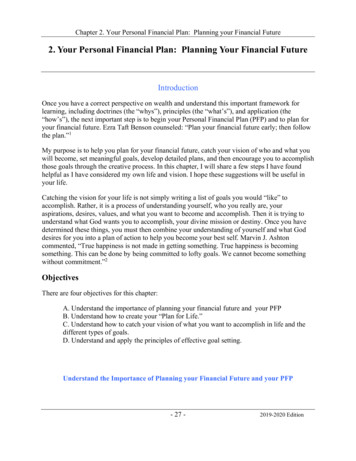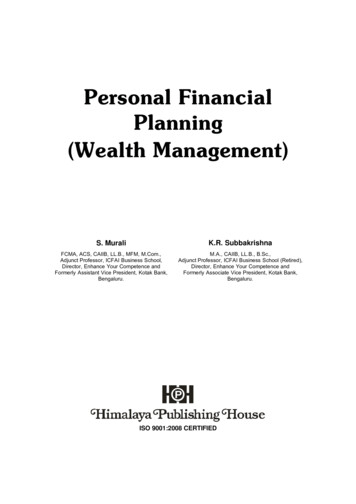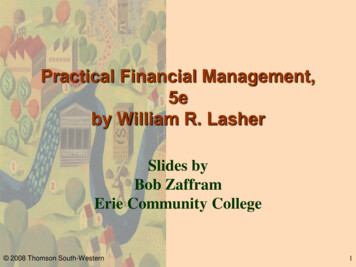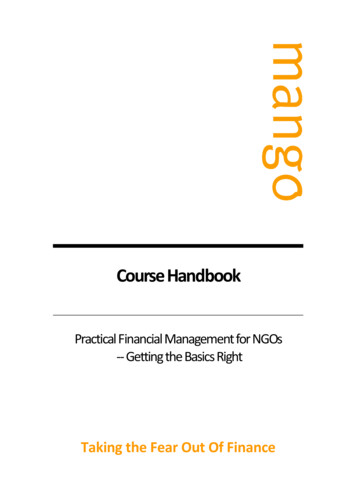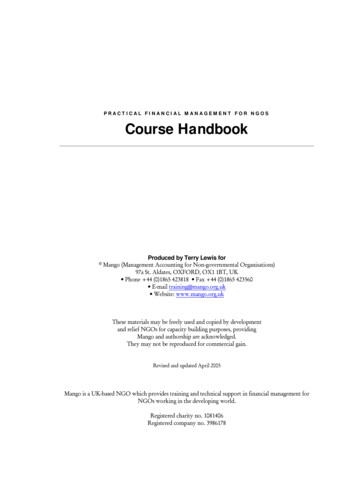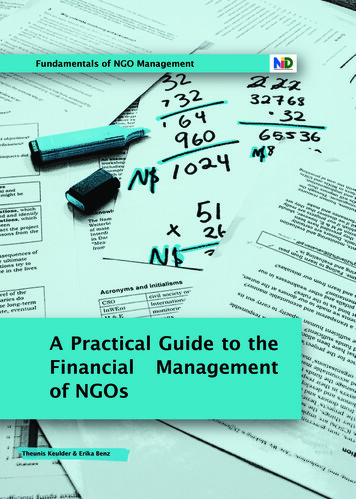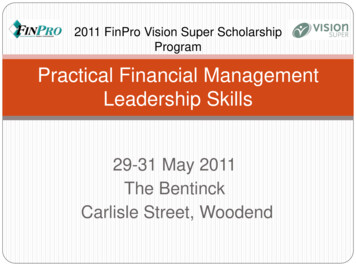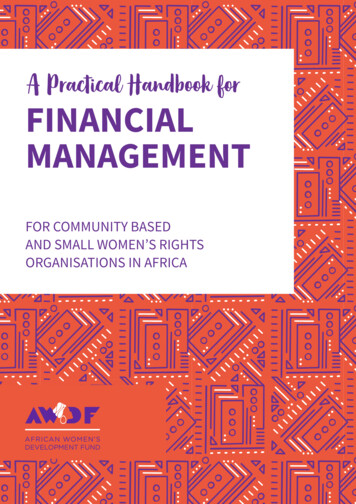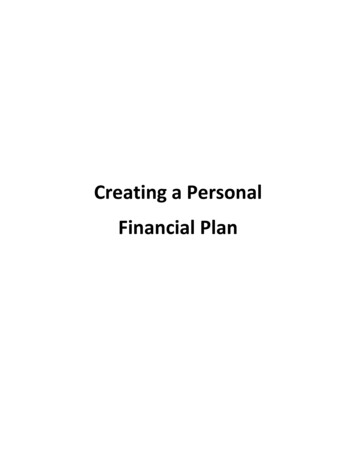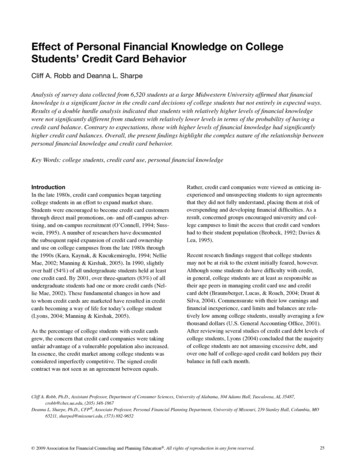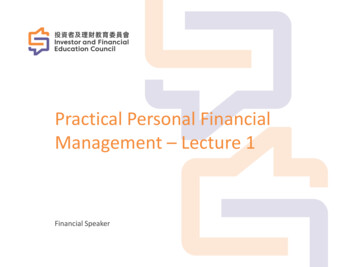
Transcription
Practical Personal FinancialManagement – Lecture 1Financial Speaker
Investor and Financial Education CouncilEstablished in 2012 and supported by the Education Bureau and fourfinancial regulators, the Investor and Financial Education Council(IFEC) is an organisation dedicated to improving financial literacy inHong Kong. The IFEC manages an independent and impartialfinancial education platform, The Chin Family, which provides freeinformation, resources and programmes to help people in Hong Kongplan and manage their finances. The IFEC was formerly known as theInvestor Education Centre (IEC).Learn more about the IFEC at www.ifec.org.hk.2
Practical Personal Financial Management Programme Programme Brief––1st guest lecture2nd guest lecture Certification of Completion–––Attend 2 guest lecturesUse Money Tracker App to make a budget and record an expenseEmailed the screen capture of the budget and expense toprogramme@ifec.org.hk Download Money Tracker App––iPhone and Android supportedChinese name: 收支管家 – 錢家有道
Practical Personal Financial Management Programme How to make a budget?(1) Input your monthly income(2) Set your target savings and planned expenses(3) Set your target expenses by categories
Practical Personal Financial Management Programme How to record an expense?(1) Select expense categories and input itemdetails (e.g. date, attach an image andremarks)(1) Input the expense amount
Practical Personal Financial Management Programme Email the two screen images to programme@ifec.org.hk The email subject should include your school name, full Englishname and student ID: ABC College Chan Tai Man 15535678
123456Importance of Financial ManagementMoney ManagementFinancial PlanningCreditInsuranceInvestmentPractical Personal Financial Management Lecture 16
Importance of moneymanagementImportant lifemanagement skill to makethe best use of moneyPractical Personal Financial Management Lecture 1FinancialindependenceFulfillment of goalsthroughdifferent stages of life7
123456Importance of Financial ManagementMoney ManagementFinancial PlanningCreditInsuranceInvestmentPractical Personal Financial Management Lecture 18
Money issues of tertiary studentsSource: IEC Research - Financial habits of key segments (tertiary students) 2015Practical Personal Financial Management Lecture 19
MoneymanagementRecord yourincomeandexpenditurePrepare yourbudget plan forsavings andexpensesPractical Personal Financial Management Lecture 1Implementyour budgetReviewyour budgetManage yourmoneyeffectively (keepexpenditurewithin the limitsof your incomeand haveenough savings)10
Expense diaryRecord your daily expenses to learnabout your consumption patternMoney tracker - the Chin FamilyExcel formalMoney tracker demo 1Type of ExpenseRepayment of Loans,Credit Card Loans andInterestsMoney tracker demo 3Money tracker demo 4Practical Personal Financial Management Lecture 10Transport35Meals150Home Expenses70Daily Necessities60ClothingMoney tracker demo 2Amount ( )0Leisure and Entertainment100Healthcare and Beauty100Furthering Education0Travelling0Total Expenditure51511
Expense diaryRecord your daily expenses to learnabout your consumption pattern andreduce unnecessary expensesMoney tracker - the Chin FamilyExcel formalMoney tracker demo 1Money tracker demo 2Money tracker demo 3Money tracker demo 4Practical Personal Financial Management Lecture 112
Expense diaryRecord your daily expenses to learnabout your consumption patternMoney tracker - the Chin FamilyExcel formalMoney tracker demo 1Money tracker demo 2Money tracker demo 3Money tracker demo 4Practical Personal Financial Management Lecture 113
Expense diaryRecord your daily expenses to learnabout your consumption patternMoney tracker - the Chin FamilyExcel formalMoney tracker demo 1Money tracker demo 2Money tracker demo 3Money tracker demo 4Practical Personal Financial Management Lecture 114
Expense diaryRecord your daily expenses to learnabout your consumption patternMoney tracker - the Chin FamilyExcel formalMoney tracker demo 1Money tracker demo 2Money tracker demo 3Money tracker demo 4Practical Personal Financial Management Lecture 115
Personal budgeting123Practical Personal Financial Management Lecture 116
Checking bank statementDateDebitCreditBalanceRemarks24 Dec 162,000.00ATM6,268.774234JNTW25 Dec 16800.00ATM5,468.775128JNTW26 Dec 16450.00ONLINE5,018.77F123NTW27 Dec 16520.50AUTO DR4,498.279995JNTW28 Dec 162,000.00ATM2,498.275005JNTW29 Dec 16INTEREST0.052,498.329995JNTD30 Dec 16AUTO CR10,000.0012,498.329995JNTD31 Dec 161,500.00AUTOPAY10,998.329995JNTDPractical Personal Financial Management Lecture 117
Checking credit card statementXXXX XXXX XXXX XXXXCredit Card Number1Credit Card TypeOutstanding Balance HKDClosing Date23Payment Due Date DD/MM/YYYYTrans DateCredit Limit HKDMinimum Payment HKDPost DateTransactionsAmount25 MarOpening BalanceHappy Meal RestaurantXXX.XX24 Mar*****Financial Charge rchaseCash Financial ce8 RewardsPractical Personal Financial Management Lecture 118
Budgeting process with 7 stepsDecide on the cycle - monthly or weekly periodsCreate a weekly or monthly budget after recording income and expenditure from the dataof your expenses diary, bank and credit card statementsRemember “paying yourself first”Subtract total expenditure from total income to know the difference and your incomeshould be balanced with saving and expensesWhen implementing the budget plan, record actual income and expenditureCompare forecasted budget against actual income and expenditureAdjust the budget for next week or month in accordance to your budgeting situation for the respective cyclePractical Personal Financial Management Lecture 119
Sample budget planIncomeBudgetedActualMonthly Income/ Pocket MoneyAllowancesOthersTotal IncomeTotal IncomeBudgetedExpenditureActualSavingRepayment of Loans and InterestsTransportMealsHome ExpensesDaily NecessitiesClothingLeisure and EntertainmentHealthcare and BeautyFurthering EducationTravellingTotal ExpenditureTotal ExpenditureTotal IncomePractical Personal Financial Management Lecture 1-Total Expenditure Surplus / Deficit20
Budgeting tips Make good use of your personal financial statements Make good use of the Chin Family resources Prioritize the needs first, wants should be set as one offinancial goalsPractical Personal Financial Management Lecture 121
SavingsPay yourself firstThe earlier you start saving or the more you can save, the sooneryou can fulfil your goalsPrepare yourself for unexpected expenses; e.g. emergency fundAchieve financial freedom earlierPractical Personal Financial Management Lecture 124
Compounding effect - Example 1Age whensaving beganNumber ofyears for savingMonthlysaving amountSavings at age 65Assumed annualinterest rate(compounding once a year)Fiona2540 1,000 480,0006%Kary3530 1,333 480,0006%Jason3530 1,000 360,0006%Total principal andinterest at age 65Around 1,857,000Around 1,265,000Around 949,000The above example is for discussion onlyPractical Personal Financial Management Lecture 139
Compounding effect - Example 2Assumed annualinterest rate(compounding once a year)JaydenKay6%6%Monthly savings / investmentfrom age 25 to 45 1,000Monthly savings / investmentfrom age 45 to 65 0(A total of 240,000 in 20 years) 0 1,000(A total of 240,000 in 20 years)Total principal andinterest at age 65Around 1,416,000Around 441,000The above example is for discussion onlySave regularly to take the advantage of compounding effectPractical Personal Financial Management Lecture 140
Savings tipsSave first, before you spendOpen another bank accountSet your own amountUse practical toolsPractical Personal Financial Management Lecture 125
Importance of Financial ManagementMoney ManagementFinancial PlanningCreditInsuranceInvestmentPractical Personal Financial Management Lecture 129
At differentlife stages,you willhave tstageslifegoals and investment strategies Singles Married, with no kids Working parents, with children Middle-aged parents, with children Pre-retirees RetireesPractical Personal Financial Management Lecture 130
Setting financial goalsShort-term goal (1-5 years)(e.g. buy a notebook, travelling or further studies)Long-term goal (6 years or above)(e.g. marriage, down payment for a flat)Turn your ‘wants’ into financials goalsPractical Personal Financial Management Lecture 132
Setting SMART goalsThe SMART principles can help you reach your goals step by ndThank You!Practical Personal Financial Management Lecture 133This publication is intended to provide a general overview for information and educational purposes only and is not a comprehensive treatment of the subject matter. The information is provided generally without considering specific circumstances and should not be regarded as a substitute forprofessional advice. IEC has not advised on, passed on the merit of, endorsed or recommended any of the products/services or types of products/services referred to in this publication. Readers shouldseek professional advice if they consider necessary.
Steps of financial planning processRegularlyreview yourfinancial planAssessyour financialposition16Work out andimplement yourfinancial planSteps offinancial planningprocess5Practical Personal Financial Management Lecture 1Preparea budget2Know yourrisk toleranceSet yourfinancial goals4341
No more interest-free period forallgettingnew rsCase1NatalieRewardsystem(includingautopay installmentpaymentsandAutomaticAddValue report:Service for Octopus card, entis anenjoy ithamonthlyincome 8,000 etinordertodetermineyour1 upt4 ayauscardholderof e.AtypeofunsecuredloanLoanamountTheloanamountis tainpublicrecordsrelatedtoprivileges!the bankruptcy-filingcouldmeanthat EETAIAMostcapcardofHK companiesassistanceagencyaccruedontheamountowed3X omprovidersForevery HK 250 retailspending ofCreditloan3 4for thepurposeMAN (DTCs)suchasarrangementfees,anyannual
Practical Personal Financial Management Lecture 1 84 Six steps to smarter borrowing 1 Work out your borrowing purposes and the amount you need to borrow 2 Shop around for the best deal and estimate the cost of loan 3 Check the terms of loan and take out the amount you can afford 4 Keep up with yourrepayments 5 Get help if you cant pay your debts
